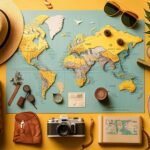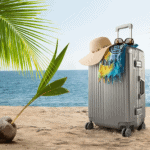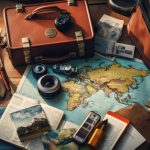
Imagine you are planning an exciting backpacking adventure. You’re ready to explore new places, meet new friends, and make unforgettable memories. But wait, have you thought about what to pack? If you’re traveling on a budget, choosing the right gear and knowing some handy tips can make your journey easier, safer, and more fun. This article will guide you through the essentials of backpacking, especially for those who want to keep their wallets happy!
The Basics: What to Pack
- Backpack: Your backpack is your home on the move. Look for a lightweight, durable backpack with comfortable straps. It should be big enough to carry your essentials but not too big that it becomes a burden.
- Clothing: Pack clothes that are versatile, quick-drying, and suitable for layering. A waterproof jacket, a cozy fleece, and a couple of t-shirts are great. Remember, you can always wash and wear, so no need to overpack.
- Footwear: Comfortable shoes are a must. Depending on your destination, choose between sturdy hiking boots or lightweight sneakers. Don’t forget a pair of flip-flops for showers and relaxed days.
- Sleeping Gear: If you plan to camp, a lightweight tent, sleeping bag, and mat are essential. Go for compact, easy-to-carry options.
- Cooking Equipment: A small, portable stove, a pot, and some basic utensils will help you whip up meals. This can save you a lot of money instead of eating out.
- Health and Hygiene: Pack a small first-aid kit, medications you might need, toothpaste, a toothbrush, and biodegradable soap. Wet wipes and hand sanitizer are also handy.
- Electronics: A smartphone can be your map, camera, and entertainment. Also, consider a power bank to keep your devices charged.
- Miscellaneous: Don’t forget a water bottle, a hat, sunglasses, and sunscreen. A compact towel and a headlamp or flashlight are also important.

Budget Tips for Backpackers
- Travel Off-Season: Plan your trip during the off-season to enjoy lower prices and fewer crowds.
- Stay in Hostels or Camp: Hostels are cheaper than hotels and a great place to meet fellow travelers. Camping can also save you a lot of money.
- Cook Your Meals: Eating out can be expensive. Use hostel kitchens or your portable stove to make simple meals.
- Use Public Transport: Buses and trains are cheaper than flights. They also offer a more authentic travel experience.
- Travel Slowly: Instead of hopping from one place to another, stay longer in one place. This reduces transport costs and lets you discover hidden gems.
- Free Activities: Look for free activities like hiking, visiting public beaches, or free city tours.
- Travel Insurance: It may seem like an extra cost, but it can save you a lot of money in case of emergencies.
Staying Safe and Connected
While you’re out exploring the world, staying safe and connected is crucial. Always let someone know your itinerary and check in regularly. Keep copies of important documents like your passport and travel insurance in a safe place. It’s also a good idea to learn a few key phrases in the local language, especially those related to help and emergencies.

Sustainable Travel Practices
As a budget traveler, you also have the opportunity to travel responsibly. Respect local cultures, traditions, and the environment. Avoid single-use plastics by carrying a reusable water bottle and bags. When you choose to buy souvenirs, support local artisans and businesses.
Making the Most of Your Adventure
Backpacking isn’t just about seeing new places; it’s about experiencing them. Engage with locals, try new foods, and immerse yourself in different cultures. Be open to changing your plans – some of the best travel experiences come from unexpected detours and recommendations from fellow travelers.
Conclusion
Backpacking is an amazing way to explore the world, especially when you’re mindful of your budget. By packing the right gear and following these tips, you can enjoy your adventure without breaking the bank. Remember, the key is to travel light, be prepared, and embrace the journey with an open heart and mind. Happy backpacking!






